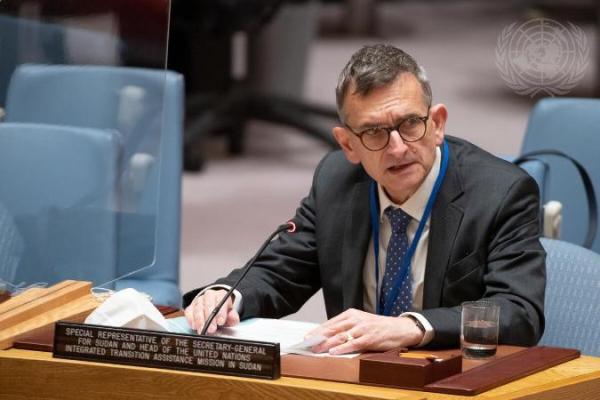Formation of new Hamdok cabinet will test Sudanese crisis: Perthes
December 10, 2021 (NEW YORK) – The formation of the new government of technocrats will test the ability of the military and political forces to end the ongoing crisis in Sudan, said the UNITAMS head.
Volker Perthes briefed the Security Council on Friday about the coup of October 25 which interrupted the democratic transition in Sudan and deepened the lack of trust between the civilian and military components.
Perthes among others spoke about ongoing efforts in Sudan to reestablish a joint civilian-military transition government as he “cautiously welcomed” the political deal signed by the coup leader and army commander in chief Abdel Fattah al-Burhan with Prime Minister Abdallah Hamdok on November 21.
“The Agreement is far from perfect but can help to avoid further bloodshed, and provide a step towards comprehensive dialogue and a return to constitutional order,” he said.
However, he underscored that the Hamdok-Burhan agreement did not rebuild trust between the Sudanese military and political groups of the Forces for Freedom and Change (FFC).
“Forthcoming decisions on government formation, high-level appointments, and the establishment of transitional institutions will test the will and ability of the stakeholders to seek a common way out of the crisis,” he stressed.
He said that this agreement may cause further divisions pointing that it includes the formulation of a political declaration entailing to amend the constitutional declaration endorsed by the FFC and the military component in August 2019.
“There are ongoing attempts within and around some political parties and movements to reach an inclusive agreement. Others (the FFC) are open to dialogue but not on the basis of the 21 November Agreement,” he said.
Perthes went further to say that the formation of a government of technocrats can create an additional “constitutional challenge” if it is not based on consultations with the FFC.
After his reinstatement, Hamdok held a series of meetings with al-Burhan to discuss the implementation of the agreement.
Also, the military component, its allied Darfur armed groups, and political factions are discussing the political declaration and the constitutional amendments without the participation of the FFC groups.
Hamdok will form his cabinet after the conclusion of these consultations.
On Friday, the FFC reiterated its rejection of the Hamdok-Burhan agreement.
“No to a political agreement that aims to legitimize the coup and form a new base,” reads a statement by the coalition of political and civil groups that took part in the December revolution.
The statement called to build a new broad coalition to resist the coup, alluding to the Sudanese communist party and some other groups that diverged with the FFC over the economic reforms.
The FFC accuses the military component of seeking to build a political alliance enabling them to avoid accountability for the bloody violence against protesters before and after the collapse of the al-Bashir regime.
The army and the RSF militia led by al-Burhan’s deputy also refuse some reforms included in the constitutional declaration that would lead to dispossessing them of economic companies and gold mines and integrating the RSF militiamen in the army.
(ST)

